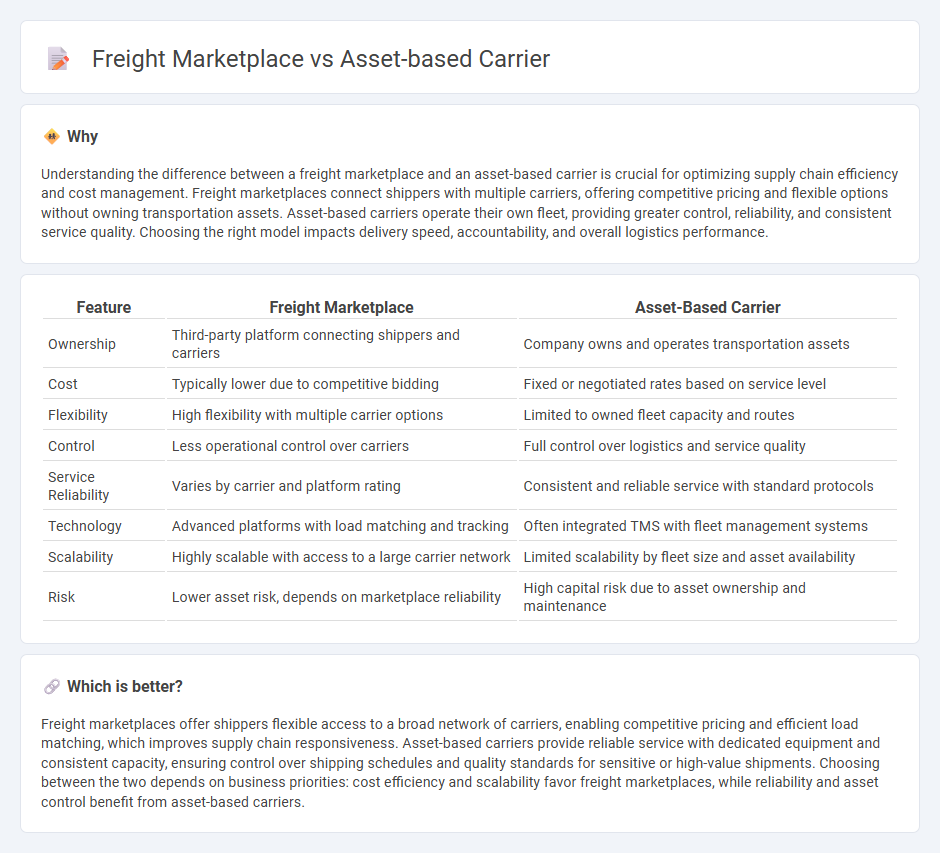
Freight marketplaces connect shippers with multiple carriers, offering flexible shipping options and competitive pricing through digital platforms. Asset-based carriers own and operate their fleets, ensuring consistent service quality and direct control over freight handling. Explore the benefits of each model to determine the best fit for your logistics needs.
Why it is important
Understanding the difference between a freight marketplace and an asset-based carrier is crucial for optimizing supply chain efficiency and cost management. Freight marketplaces connect shippers with multiple carriers, offering competitive pricing and flexible options without owning transportation assets. Asset-based carriers operate their own fleet, providing greater control, reliability, and consistent service quality. Choosing the right model impacts delivery speed, accountability, and overall logistics performance.
Comparison Table
| Feature | Freight Marketplace | Asset-Based Carrier |
|---|---|---|
| Ownership | Third-party platform connecting shippers and carriers | Company owns and operates transportation assets |
| Cost | Typically lower due to competitive bidding | Fixed or negotiated rates based on service level |
| Flexibility | High flexibility with multiple carrier options | Limited to owned fleet capacity and routes |
| Control | Less operational control over carriers | Full control over logistics and service quality |
| Service Reliability | Varies by carrier and platform rating | Consistent and reliable service with standard protocols |
| Technology | Advanced platforms with load matching and tracking | Often integrated TMS with fleet management systems |
| Scalability | Highly scalable with access to a large carrier network | Limited scalability by fleet size and asset availability |
| Risk | Lower asset risk, depends on marketplace reliability | High capital risk due to asset ownership and maintenance |
Which is better?
Freight marketplaces offer shippers flexible access to a broad network of carriers, enabling competitive pricing and efficient load matching, which improves supply chain responsiveness. Asset-based carriers provide reliable service with dedicated equipment and consistent capacity, ensuring control over shipping schedules and quality standards for sensitive or high-value shipments. Choosing between the two depends on business priorities: cost efficiency and scalability favor freight marketplaces, while reliability and asset control benefit from asset-based carriers.
Connection
Freight marketplaces connect shippers with asset-based carriers by providing a digital platform that streamlines load matching and booking processes. Asset-based carriers benefit from increased load visibility and efficient route planning, while shippers gain access to reliable transportation options and real-time tracking. This integration enhances supply chain efficiency and reduces empty miles, optimizing overall logistics operations.
Key Terms
Fleet Ownership
Asset-based carriers own and operate their own fleets of trucks, enabling greater control over vehicle maintenance, scheduling, and service quality. Freight marketplaces connect shippers with various transport providers, offering flexibility without requiring investment in fleet ownership or management. Explore the advantages and challenges of each model to determine the best fit for your logistics strategy.
Digital Platform
Asset-based carriers operate fleets of trucks and handle freight directly, offering reliable control over shipping schedules and cargo security through owned physical resources. Freight marketplaces function as digital platforms connecting shippers with various carriers, providing extensive freight options and dynamic pricing by leveraging real-time data and algorithm-driven matching. Explore the evolving landscape of digital platforms transforming logistics efficiency and carrier selection.
Load Matching
Asset-based carriers own and operate their own fleets, offering guaranteed capacity and control over shipping schedules, while freight marketplaces connect shippers with multiple carriers through a digital platform, optimizing load matching by leveraging real-time data and carrier availability. Load matching in asset-based carriers relies heavily on internal resources and predefined routes, whereas freight marketplaces utilize algorithms and extensive network data to efficiently pair loads with available carriers across diverse regions. Explore how advanced load matching technologies can transform your logistics strategy for enhanced efficiency and cost savings.
Source and External Links
The Role of Asset-Based Carriers in a Changing Transport Landscape - Asset-based carriers are companies that own and operate their transportation assets like trucks and warehouses, offering direct control and reliability over transportation services compared to brokers who do not own assets but act as intermediaries.
The Top 5 Advantages of Working With Asset-Based Carriers - Asset-based carriers own their fleet and employ drivers, providing dependable and financially stable transportation services by relying on their own assets rather than matching loads through a network like third-party brokers.
What are Asset or Non Asset-Based Carrier Types? - Asset-based carriers own all their equipment, including trucks, warehouses, and other infrastructure, often offering full-service supply chain solutions without extra management fees, which can save clients money.
 dowidth.com
dowidth.com